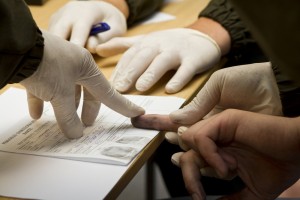 Anyone who has ever watched CSI, NCIS or SVU has seen television police collecting evidence at a crime scene, which they then match to a perpetrator later in the episode. These scenes are not too far from the truth. Crime scene investigators do collect a great deal of evidence to present to the court at a later point in time – including DNA, if available, and fingerprints. The problem we see is that this evidence can easily be contaminated and is subject to human error.
Anyone who has ever watched CSI, NCIS or SVU has seen television police collecting evidence at a crime scene, which they then match to a perpetrator later in the episode. These scenes are not too far from the truth. Crime scene investigators do collect a great deal of evidence to present to the court at a later point in time – including DNA, if available, and fingerprints. The problem we see is that this evidence can easily be contaminated and is subject to human error.
While television crime shows use fully automated systems to identify exact matches for fingerprints, the reality is that police computers merely narrow down the search. Humans make the final “match” based on observable markings – and, even then, professionals do not agree on the standards required to declare an accurate match. CBS News reports, “In Italy, for example, examiners say they have to see 16 or 17 points of similarity. In Brazil, it’s 30; in Sweden, it’s seven points; and in Australia, it’s 12. And most examiners in the United States, including those at the FBI, don’t even use a point system.”
Fingerprinting is one of the oldest forms of evidence in the criminal justice system – used for more than 100 years – and it remains popular today because it is easy to present to juries. Fingerprinting relies on two factors:
1) “Friction ridge patterns” on your fingers never change
2) Each friction ridge pattern is unique
People’s hands are never truly “clean.” Sweat, body oils, dirt, and even items you may have recently touched leave residue on your hands that comes off on nearly every surface you touch. These fingerprints can be located in a number of ways and “lifted” for further inspection back at the police station. Computer enhancement and laser technology have greatly increased the accuracy of fingerprinting techniques over the years, but have by no means perfected the art.
While it is true that each fingerprint is unique and identifiable, there are endless things to consider when determining whether what police believe is a “match” is actually admissible evidence in a court of law. Often, the only evidence police have to go on is a partial print. If the print is distorted or contaminated, it could impact the accuracy of the match.
So, how do authorities get your fingerprints, anyway? People are fingerprinted for a variety of reasons – even if they have not committed a crime. Many people are fingerprinted when they begin jobs in public safety or health occupations, and children may be fingerprinted by parents, local police departments, or schools to assist in the event of a child abduction. All of these prints are kept in police databases and can be searched should a crime be committed in the future.
While law enforcement would like to present fingerprints as the “perfect” form of evidence, plenty of flaws still exist with this technology. Many criminal lawyers believe fingerprint evidence should be barred as evidence based on the fact that there has never been a scientific study done to confirm its accuracy.
So, does fingerprint evidence mean an automatic conviction? Of course not! There is plenty of doubt when it comes to fingerprint evidence. The key is to call a qualified Phoenix, AZ criminal lawyer who understands the complexity of fingerprinting and its many flaws. Claim your free consultation today and allow us to achieve the best possible results for your case.






 Espaňol
Espaňol